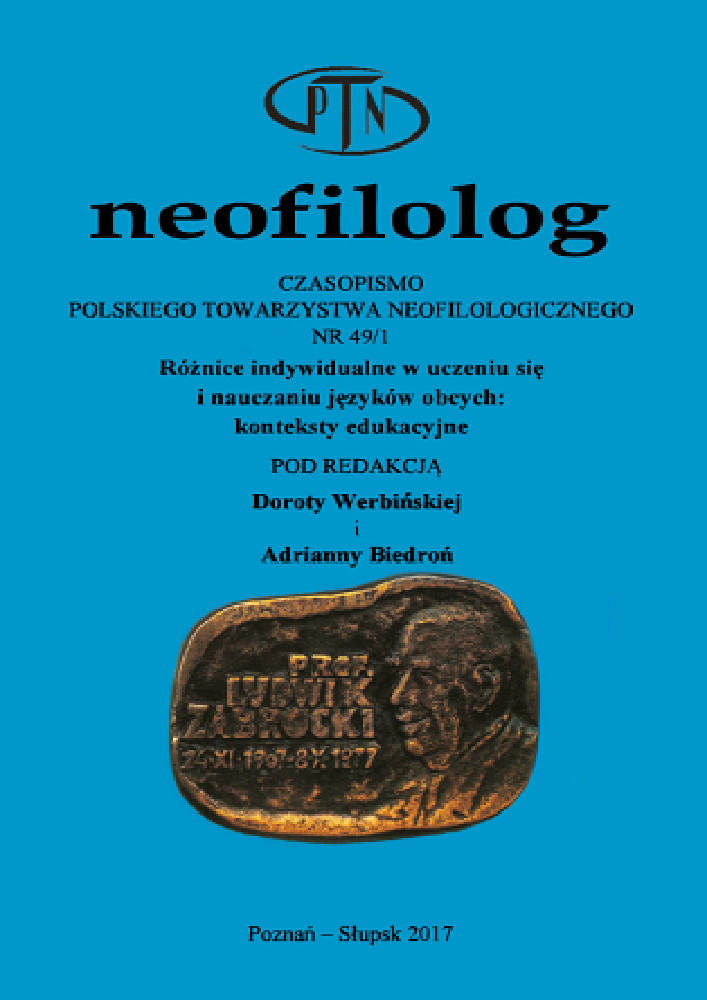Abstract
School achievement in foreign languages is often reported in mean scores, or on normalized scales, where schools are compared with each other and against a national average. This has led to the common belief that rural lower secondary schools in Poland are ‘worse’ than schools in larger centres of population. This paper sets out to demonstrate that such a view is erroneous as it fails to take into consideration the context, either at the level of the school as a whole, or at the level of individual learners. Based on data obtained from the first two years of a large scale longitudinal research project, “Teaching and Learning Foreign languages” (BUNJO 2012, 2013), this case study describes the context of one lower secondary school in a village in the east of Poland and profiles four teenage learners (aged 13-14) who attend this school and their achievement in English over the period of one year.References
Dörnyei, Z. 2005. The Psychology of the Language Learner: Individual differences in second language acquisition. Mahwah, NJ: Lawrence Erlbaum.
Dörnyei, Z. 2009. “Individual differences: interplay of learner characteristics and learning environment.” Language Learning, 59(1), 230-248.
Duckworth, A. L., Peterson, C., Matthews, M. D. & Kelly, D. R. (2007). “Grit: Perseverance and passion for long-term goals.” Journal of Personality and Social Psychology, 92(6), 1087-1101.
Dweck, C. 2006. Mindset: the New Psychology of Success. New York: Ballantine.
Gardner, R. C. 2006. “Motivation and Second Language Acquisition.” Paper based on address given Seminario Sobre Plurilingüismo: Las Aportaciones Del Centro Europeo de Lenguas Modernas de Graz, on December 15, 2006 at the Universidad de Alcalá, Spain. http://publish.uwo.ca/~gardner/docs/SPAINTALK.pdf.Accessed 2.01.2017.
Gardner, R. C. 2010. Motivation and Second Language Acquisition: The Socio-Educational Model. New York: Peter Lang.
Higgins, E. T. 1998. “Promotion and prevention: Regulatory focus as a motivational principle.” Advances in Experimental Social Psychology, 30, 1-46.
Markus, H. R. & Nurius, P. 1989. “Possible selves.” American Psychologist, 41, 954-969.
Mercer, S. & Ryan, S. 2010. “A mindset for EFL: learners’ beliefs about the role of natural talent.” ELT Journal 64 (4), 436-444.
Norton, B. 2001. Non-participation, imagined communities and the language classroom.” In: Breen, M. P. (ed.), Learner Contributions to Language Learning. Harlow: Pearson Education, pp. 159-171.
Sutherland, A., Ilie, S. & Vignoles, A. 2016. Factors associated with achievement: Key Stage 2. Rand Europe/Department for Education. https://www.gov.uk/government/uploads/system/uploads/attachment_data/file/473674/RR486_Factors_associated_with_achievement_-_key_stage_2.pdf. Accessed 2.01.2017.
Ushioda, E. 2009. “A person-in-context relational view of emergent motivation, self and identity.” In: Dörnyei, Z. & Ushioda, E. (eds.), Motivation, Language Identity and the L2 Self. Bristol: Multilingual Matters, pp. 215-228.
Ushioda, E. 2011. “Language learning motivation, self and identity: current theoretical perspectives.” Computer Assisted Language Learning, 24, 199-210.
Waters, T., Marzano, R. J., McNulty, B. 2003. “Balanced Leadership: What 30 Years of Research Tells Us about the Effect of Leadership on Student Achievement. A Working
License
Copyright (c) 2017 Melanie Ellis

This work is licensed under a Creative Commons Attribution-NoDerivatives 4.0 International License.
Authors
Authors of texts accepted for publication in Neofilolog are required to complete, sign and return to the Editorial team’s office the Agreement for granting a royalty-free license to works with a commitment to grant a CC sub-license.
Under the agreement, the authors of the texts published in Neofilolog grant Adam Mickiewicz University in Poznań a non-exclusive, royalty-free license and authorize the use of Attribution-NoDerivatives 4.0 International (CC BY-ND 4.0) Creative Commons sub-license.
The authors retain the right to the free disposal of the work.
Users
Interested Internet users are entitled to use works that have been published in Neofilolog since 2017, under the following conditions:
▪ attribution – obligation to provide, together with the distributed work, information about the authorship, title, source (link to the original work, DOI) and the license itself.
▪ no derivatives – the work must be preserved in its original form. Without the author's consent, it is not possible to distribute the modified work in the form of translations, publications, etc.
Copyrights are reserved for all texts published since 2017.
Miscellaneous
Adam Mickiewicz University in Poznań retains the property right as a whole (layout, graphic form, title, cover design, logo etc.).
